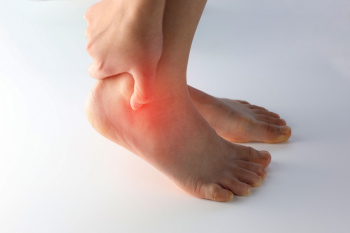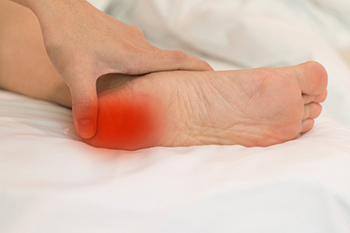
Tarsal tunnel syndrome, a condition affecting the feet and ankles, arises from compression of the tibial nerve as it passes through the tarsal tunnel, which is a narrow space on the inside of the ankle. Similar to carpal tunnel syndrome in the wrist, this ailment can lead to pain, tingling, and numbness in the affected area. The tibial nerve, responsible for sensory and motor functions of the foot and ankle, becomes compressed due to various factors such as injury, inflammation, or underlying medical conditions like arthritis or diabetes. Individuals with flat feet or those engaging in repetitive activities that stress the foot may also be at higher risk. Symptoms of tarsal tunnel syndrome include burning sensations, electric shock-like pain, and weakness in the foot. Prompt diagnosis and treatment, which often involves rest, can help alleviate symptoms and prevent further complications. If you have pain on the inside of your ankle, it is suggested that you consult a podiatrist who can accurately diagnose and treat tarsal tunnel syndrome.
Tarsal tunnel syndrome can be very uncomfortable to live with. If you are experiencing tarsal tunnel syndrome, contact Dr. Richard DiMario of Maine. Our doctor can provide the care you need to keep you pain-free and on your feet.
Tarsal Tunnel Syndrome
Tarsal tunnel syndrome, which can also be called tibial nerve dysfunction, is an uncommon condition of misfiring peripheral nerves in the foot. The tibial nerve is the peripheral nerve in the leg responsible for sensation and movement of the foot and calf muscles. In tarsal tunnel syndrome, the tibial nerve is damaged, causing problems with movement and feeling in the foot of the affected leg.
Common Cause of Tarsal Tunnel Syndrome
The Effects of Tarsal Tunnel Syndrome
A physical exam of the leg can help identify the presence of tarsal tunnel syndrome. Medical tests, such as a nerve biopsy, are also used to diagnose the condition. Patients may receive physical therapy and prescriptive medication. In extreme cases, some may require surgery.
If you have any questions please feel free to contact our office located in York, ME . We offer the newest diagnostic and treatment technologies for all your foot and ankle needs.

Foot stress fractures, though difficult to recognize, can have a significant impact on daily life. Stress fractures, often caused by repetitive impact and overuse, cause localized pain in the affected foot. This pain typically worsens during weight-bearing activities but subsides with rest. Swelling and tenderness surrounding the injury site are common, sometimes accompanied by bruising. It is important to note that symptoms can be gradual, with pain developing over time as opposed to a sudden onset. As stress fractures can occur in various foot bones, the specific location of pain can offer insights into the affected area. Seeking professional medical evaluation from a podiatrist for persistent or worsening symptoms is important to prevent long-term complications. If feel you may have a foot stress fracture, it is suggested that you consult a podiatrist who can conduct an exam and prescribe treatment methods that are correct for you.
Activities where too much pressure is put on the feet can cause stress fractures. To learn more, contact Dr. Richard DiMario from Maine. Our doctor can provide the care you need to keep your pain free and on your feet.
Dealing with Stress Fractures of the Foot and Ankle
Stress fractures occur in the foot and ankle when muscles in these areas weaken from too much or too little use. The feet and ankles then lose support when walking or running from the impact of the ground. Since there is no protection, the bones receive the full impact of each step. Stress on the feet can cause cracks to form in the bones, thus creating stress fractures.
What Are Stress Fractures?
Stress fractures occur frequently in individuals whose daily activities cause great impact on the feet and ankles. Stress factors are most common among:
Symptoms
Pain from the fractures occur in the area of the fractures and can be constant or intermittent. It will often cause sharp or dull pain with swelling and tenderness. Engaging in any kind of activity which involves high impact will aggravate pain.
If you have any questions please feel free to contact our office located in York, ME . We offer the newest diagnostic and treatment technologies for all your foot and ankle needs.
 Experiencing heel pain can significantly impact your daily life, making even simple tasks like walking or standing uncomfortable. Podiatrists, medical professionals specializing in foot and ankle health, can diagnose and treat heel pain. These types of doctors understand the complex structure of the foot and can identify the underlying causes of heel pain. Included are overuse injuries like plantar fasciitis, bone spurs, or Achilles tendonitis. Targeting the underlying cause of heel pain is important for appropriate care. It is especially important to seek the advice of a podiatrist if you have persistent pain, and if the pain comes suddenly or after an injury. A podiatrist can offer a personalized treatment plan that may include specialized exercises, custom orthotics, medication, or advanced therapies designed to alleviate pain and promote healing. Podiatrists can also provide valuable guidance on footwear choices and lifestyle modifications to prevent future pain. If you are suffering from heel pain, it is suggested you seek the help of a podiatrist for diagnosis and care.
Experiencing heel pain can significantly impact your daily life, making even simple tasks like walking or standing uncomfortable. Podiatrists, medical professionals specializing in foot and ankle health, can diagnose and treat heel pain. These types of doctors understand the complex structure of the foot and can identify the underlying causes of heel pain. Included are overuse injuries like plantar fasciitis, bone spurs, or Achilles tendonitis. Targeting the underlying cause of heel pain is important for appropriate care. It is especially important to seek the advice of a podiatrist if you have persistent pain, and if the pain comes suddenly or after an injury. A podiatrist can offer a personalized treatment plan that may include specialized exercises, custom orthotics, medication, or advanced therapies designed to alleviate pain and promote healing. Podiatrists can also provide valuable guidance on footwear choices and lifestyle modifications to prevent future pain. If you are suffering from heel pain, it is suggested you seek the help of a podiatrist for diagnosis and care.
Many people suffer from bouts of heel pain. For more information, contact Dr. Richard DiMario of Maine. Our doctor can provide the care you need to keep you pain-free and on your feet.
Causes of Heel Pain
Heel pain is often associated with plantar fasciitis. The plantar fascia is a band of tissues that extends along the bottom of the foot. A rip or tear in this ligament can cause inflammation of the tissue.
Achilles tendonitis is another cause of heel pain. Inflammation of the Achilles tendon will cause pain from fractures and muscle tearing. Lack of flexibility is also another symptom.
Heel spurs are another cause of pain. When the tissues of the plantar fascia undergo a great deal of stress, it can lead to ligament separation from the heel bone, causing heel spurs.
Why Might Heel Pain Occur?
Treatments
Heel pain should be treated as soon as possible for immediate results. Keeping your feet in a stress-free environment will help. If you suffer from Achilles tendonitis or plantar fasciitis, applying ice will reduce the swelling. Stretching before an exercise like running will help the muscles. Using all these tips will help make heel pain a condition of the past.
If you have any questions please contact our office located in York, ME . We offer the newest diagnostic and treatment technologies for all your foot and ankle needs.

The feet can be affected by falling. In older adults, this may lead to them having difficulty in completing daily activities. Ensuring a safe living space for aging loved ones is vital for their well-being and independence. Begin by decluttering walkways and removing tripping hazards such as loose rugs or electrical cords. Install handrails along stairways and in bathrooms to provide stability and support. Secure carpets and rugs with non-slip backing to prevent slips and falls. Improve lighting throughout the home, especially in hallways, staircases, and entrances. Consider installing grab bars and shower chairs in bathrooms, and keep commonly used items within easy reach to avoid the need for reaching or bending over. Additionally, consider investing in assistive devices, such as mobility aids or medical alert systems, for added safety and peace of mind. Regularly assess the home environment for potential hazards, and make necessary adjustments to promote a secure and comfortable living environment for aging loved ones. If you are seeking additional falls prevention methods that can protect the feet, it is suggested that you consult a podiatrist who can offer you valuable information.
Preventing falls among the elderly is very important. If you are older and have fallen or fear that you are prone to falling, consult with Dr. Richard DiMario from Maine. Our doctor will assess your condition and provide you with quality advice and care.
Every 11 seconds, an elderly American is being treated in an emergency room for a fall related injury. Falls are the leading cause of head and hip injuries for those 65 and older. Due to decreases in strength, balance, senses, and lack of awareness, elderly persons are very susceptible to falling. Thankfully, there are a number of things older persons can do to prevent falls.
How to Prevent Falls
Some effective methods that older persons can do to prevent falls include:
Falling can be a traumatic and embarrassing experience for elderly persons; this can make them less willing to leave the house, and less willing to talk to someone about their fears of falling. Doing such things, however, will increase the likelihood of tripping or losing one’s balance. Knowing the causes of falling and how to prevent them is the best way to mitigate the risk of serious injury.
If you have any questions, please feel free to contact our office located in York, ME . We offer the newest diagnostic and treatment technologies for all your foot care needs.